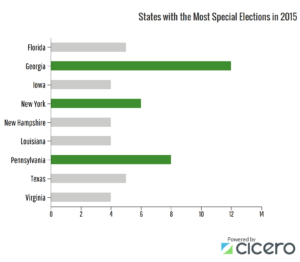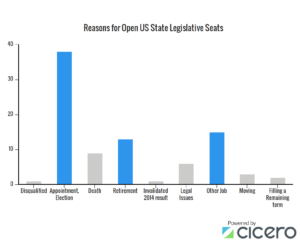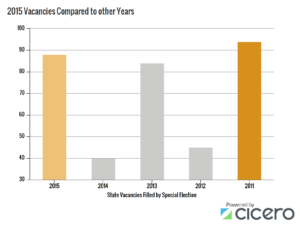2015 was a turbulent year for state legislatures in the US. It is not unheard of for legislators to step down mid-term, however the past year saw a whopping 88 seats vacated by State Senators and Representatives. When an elected official steps down before their term is over, the seat is either filled by an appointment or a special election. Twenty-three states appoint successors, either through the Governor’s office, or by the party last occupying the seat. A slightly greater number of states hold special elections to fill empty seats. In this case, a district’s constituents are without representation until the newly elected official takes office, which is often months after the seat was first vacated.
Why all the Change?
A legislator may choose to leave their post for various reasons. In 2015, the top reason for open seats was due to an official being appointed or elected to an alternate position. For example, a
Governor or Mayor may call on a State Senator to leave the legislature to serve in their cabinet. This appointment may then set off a series of special elections, as it is common for a State Representative to run for that open State Senate position (typically referred to as a “promotion” to a higher legislature). Similarly, a legislator may leave their seat to run in another election. This happened in February in Texas SD-26 when Senator Leticia Van de Putte left her seat to run for Mayor of San Antonio. Jose Menendez, an incumbent in Texas HD-124 won that election, setting off yet another special election for his newly vacant house seat.
The second most popular reason for an elected official retiring in 2015 was to accept a job in the private sector. Some state legislatures are considered “part-time” and many officials carry additional jobs. New Hampshire’s Rockingham 20 House District Representative Dennis B. Sweeney held a zero percent voting record four months into his 2015 term. He ultimately stepped down because his work schedule prevented him from attending sessions.
Repeat Offenders
So, which states had the most special elections in 2015? 2 or 3 elections might be typical for a state in any given year, but in 2015 Georgia held a monumental 12 special elections–a recent all time high.  That is the more than any state going back to 2011. Interestingly, Georgia was the winner that year as well, with 11 polls for vacated positions. Coming up second this year was Pennsylvania, with 8 special elections, 6 of which occurred in the second half of the year.
That is the more than any state going back to 2011. Interestingly, Georgia was the winner that year as well, with 11 polls for vacated positions. Coming up second this year was Pennsylvania, with 8 special elections, 6 of which occurred in the second half of the year.
Comparatively
88 vacant seats may seem like a lot. But how does it compare to years past? In the previous 4 years, 2011 was the only year to exceed 2015 in terms of vacant seats up for special election, with a grand total of 94. This actually makes sense. In 4 year election cycles, the year before a Presidential election (in which many other states also hold state elections) typically sees a lot of activity. This is due in part to legislators resigning seats to run for different, open ones. The previous years, (2010 and 2014) also saw mid-term elections during which new administrations may have taken office and appointed Senators and Representatives to cabinet positions. If appointments take time, the open seats they create may not be reflected until the following year.
2013 also saw a high number of vacant seats filled with special elections, with a total of 84. Because odd years see very few state elections, Special Elections must be called, rather than an even-year option of waiting until the next scheduled general election. Many state laws specify that if a seat becomes vacant within a few months of a scheduled, general election, the seat will wait to be filled at that time. This unfortunately leaves a district without representation, but it does save the state a significant amount of money. Special elections often cost hundreds of thousands of dollars and see very low turnout from the electorate.
Moving Forward
Wondering if 2016 will be more of the same? Heading into the second month of the year, 34 state legislative seats are already open. 20 special elections have been scheduled, and 3 remain unscheduled at this time. At least 6 more open seats are awaiting appointment. And you can bet there will be more.
The Cicero database keeps track of Special Elections for all 50 states in the US, at the National, State, and even local levels for our largest cities. If you’re interested in learning more, give us a shout via email (cicero@azavea.com) or Twitter (@CiceroAPI). We’d love to talk elections with you!


